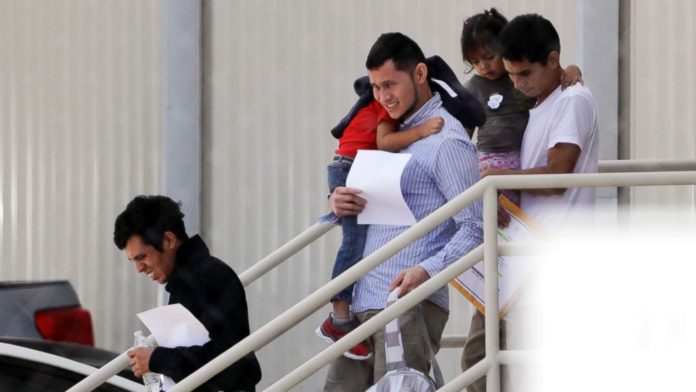The Trump administration on Tuesday missed its first court-ordered deadline to reunify families separated at the border as it rushes to confirm the identities of parents and match records of the disparate agencies involved.
A San Diego federal judge had ordered the government to reunite all children under five years old by July 10, but as of Wednesday only four reunifications had been confirmed.
Government attorneys and administration officials said of the 102 children under five who had been separated, 38 were expected to be reunified by Tuesday. Late Wednesday evening, an administration official told ABC News that they anticipate that as of early morning on July 12, they will have reunified all children under age 5 who are eligible under the court order for reunification with parents in the United States.
In a hearing on Tuesday, the judge acknowledged that not all 102 of these very young children could be immediately sent back to their parents – because some parents were deported without their children or had possible criminal backgrounds, for example — but told the government that they must reunify 59 children.
A federal lawsuit brought by the American Civil Liberties Union (ACLU) in February to reunite an asylum-seeking Congolese mother with her daughter expanded to a class-action lawsuit after the Department of Justice (DOJ) implemented its “zero-tolerance” policy of prosecuting all illegal border crossers.
In June, the judge ruled that children forcibly separated by U.S. authorities at the border would have to be reunited, laying out a timeline for total reunification by July 26, 2018.
“These are firm deadlines and not aspirational goals,” said the judge, Dana Sabraw, at a hearing on Tuesday.
Children waiting for reunification
The Department of Health and Human Services (HHS) determined that only 75 of the 102 children under five years old are eligible for reunification. Seventeen reunifications were pending DNA test results and there was one 3-year-old child for whom the government said it had no information about the parents.
The government now thinks that the child may have U.S. citizen parents and was placed in the wrong system.
Twenty-seven children are not eligible for immediate reunification, because of parental criminal history, pending criminal custody or other disqualifying factors.
“The court could not have been clearer that business as usual is not acceptable,” said Lee Gelernt, deputy director of the ACLU’s Immigrants’ Rights Project. “The Trump administration must get these children and parents reunited.”
The administration has argued that they are working to meet the court deadline and the delays are necessary to ensure the safety and well-being of the children in their care.
“Our process may not be as quick as some would like, but there is no question that it is protecting children,” said HHS Chief of Staff for the Office of the Assistant Secretary for Preparedness and Response Chris Meekins. “The…










